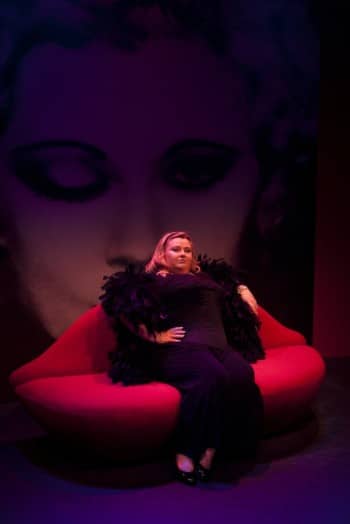Dirty Blonde – Darlinghurst Theatre
Mae West is a lingering icon of a very different time who was well ahead of her time. Remembered for her sex appeal, her early, no-holds-barred feminism, and her bawdy double-entendres, West is a figure that inspires admiring and obsessive fans.

Dirty Blonde is about those fans. Two fans, in particular – Jo, the brash Brooklynite who identifies with West, an amateur-actress-slash-office-temp, and Charlie, a kind film archivist from the Midwest who escapes neatly into West’s fantasy life. Backdropped by sequences from West’s life and biography, Jo and Charlie meet, bond, and demonstrate a legacy that not only lives on well after the diminishment of one of our brightest stars, but fosters an understanding and connection between two grown-up outcasts.
Directed by Stuart Maunder and designed by Matthew Aberline, this three-hander is marked by simple set pieces – red curtains, two chairs, and a backdrop of West’s face punctuated by a sofa that’s in direct reference to Salvador Dali’s 1938 wood and satin work “Mae West Lips Sofa”; the entire setup is reminiscent of the sofa’s display in the Dali Museum Mae West Room in Figueres. This is a play that takes its West seriously.
There’s a charm to this show, from its roughshod production feel (this is independent theatre that leans heavily on the influences of intimate cabaret, and it works), to its impressive pedigree. Directed in New York by frequent Sondheim collaborator James Lapine (Into the Woods), all its cast were nominated for Tony awards in 2000.
While the play is light, it charms with its Mae West musical numbers (the music is by Isaac Hayward, who meets his cues with nimble aplomb) and vaudevillian grabs for laughs, and all three cast members understand the nuance of timing – banter only works if the cast can keep up, and they can all keep up. This is comfortable for the cast because it’s all in their wheelhouse as performers; the choices that are made aren’t necessarily exciting, but they work.
Lara Mulcahy pulls double duty as obsessive Jo (the real promise of this play that is not quite fully explored but rewarding as it stands is the nature of obsessive fandom; Mulcahy inhabits this with a pleasing self-awareness) and as Mae West herself. Mulcahy is more than familiar with cabaret and performance, and she handles the dual characters with ease; her voice is a fun homage to West’s distinctive husky croon.
Mark Simpson, a figure in Sydney independent theatre who has unassuming self-deprecation down to an art, is the ostensible heart of the piece as Charlie, the man who, at seventeen, travels to Los Angeles and waits for a glimpse of West, having an encounter with his favourite star that shapes the trajectory of his life. Funny, conflicted, and playful, his relationship with Jo is always enjoyable to watch, even if it does not quite reach its intended impact.
Stealing scenes left right and centre is Philip Dodd, whose lanky form and wide grin is something of a vaudeville dream; fresh off Mary Poppins, he plays a cast of performers, go-betweens, and friends and lovers of West’s with pure enjoyment. His physical comedy is fully realised and charming, a sort of Dick van Dyke/Frank Woodley treasure of full-bodied performance. He lightens the mood and transitions the action easily between time, place, and emotional status. Dodd’s cadre of characters is the mechanics on which Dirty Blonde rests, and he is the largest contributor to its polish and sparkle.
This play-with-musical-numbers isn’t groundbreaking, and at 110 minutes without interval attention wanders in brief moments, but it’s fun, and it’s easy to watch and relax into, and if you’re having half the ball the actors are having then it’s going to be a grand old time – and that’s what you’ll find yourself having.

